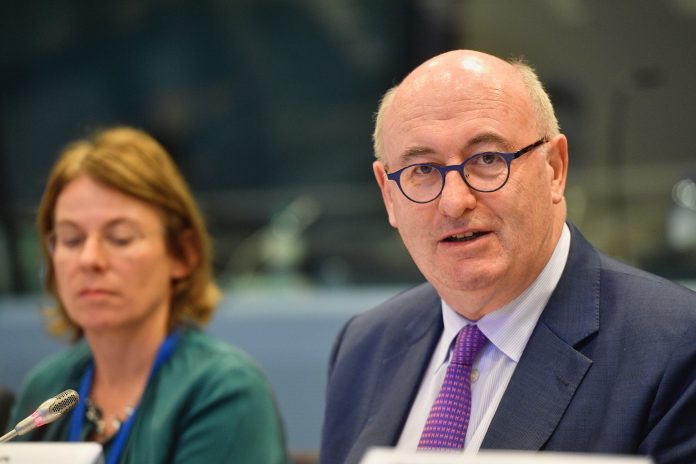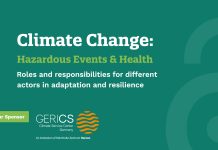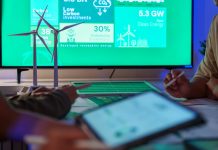Commissioner Phil Hogan shared his views on how the Common Agricultural Policy (CAP) is helping to shape the EU to implement Sustainable Development Goals, during a speech he delivered on 11th May 2018 at the at German Catholic Days, Muenster in Germany
I am grateful for this opportunity to discuss the Common Agricultural Policy (CAP) and its role in helping the EU to implement the Sustainable Development Goals, including the one on Climate Action.
It is important first of all to recognise how far the policy has come. The CAP is now a modern, outward-looking policy, mindful of its responsibilities both at home and abroad.
One of the more persistent myths about the CAP is that it discriminates against farmers in the developing world by supporting EU agriculture and distorting world market prices. In fact, the truth of the matter is that over 90% of EU farmer support has zero distorting effect on trade because it is no longer linked to the quantity produced.
For many years now, our agriculture policy has been in line with overall EU development objectives. Market measures are still allowed, it is true – but only in the case of crisis and even then, price support for farmers is set at levels that are generally well below normal market conditions.
This has the effect of reducing EU surpluses and bringing us into line with global prices. Crucially, export refunds ceased to exist on 1 January 2014 and the EU was the driving force behind the World Trade Organization (WTO) decision to scrap all trade-distorting export subsidies in December 2015.
Furthermore, the CAP is now increasingly development friendly, with extremely favourable trading conditions for nations across the developing world.
Successive policy reforms of the last 25 years have seen the Common Agricultural Policy move away from coupled support tied directly to the production of particular products to supporting farmers in a way that is non-market and non-trade distorting in non-EU countries. The recent articles I mentioned have been based on an outdated and incorrect view of the CAP that in no way reflects the current EU system of support for farmers which is mainly aiming at rewarding public goods and market orientation.
Let us instead focus on the facts: the reality is that the EU gives duty-free and quota-free access to all Less Developed Countries (LDCs) and unilateral concessions to developing countries. We have developed Economic Partnership Agreements – free trade agreements – that were carefully crafted to allow our partner countries to protect their sensitive agricultural products from liberalisation, either by excluding them entirely or by allowing robust safeguards that can be used to guard against sudden increases in imports.
We continue to work closely with our partner countries in the developing world to share expertise and best practice on agriculture and food safety. People are often surprised to learn that the EU is the world’s largest importer of agricultural products from Less Developed Countries.
Commissioner Phil Hogan shared his views on how the Common Agricultural Policy (CAP) is helping to shape the EU to implement Sustainable Development Goals, during a speech he delivered on 11th May 2018 at the at German Catholic Days, Muenster in Germany
In 2015, the EU imported agri-food products from these nations worth €3.4 billion a full 13% increase on the previous year. And we are by far the biggest supporters of farmers in Less Developed Countries: Europe imports from these countries more than the US, China, Japan, Russia and Canada combined.
Over the last two years, we have made continued efforts to promote responsible agri-food investments in Africa: investments which avoid land grabbing, pay a decent return to farmers and recognise their central role in the food value chain.
This approach also drives the global agenda at G7 and G20 level. The key common element is the focus on “facilitating responsible investments in Africa to boost jobs and growth”, as well as tackling some of the root causes of irregular and illegal migration such as poverty and food insecurity.
Taking all these changes into account, I hope you will agree with my assessment that the CAP and EU policies relating to the developing world, in general, have come a long way.
Now we must look to the future.
I am fully convinced that we must complement our trade and aid efforts with improved policy cooperation with our African partners.
We need to introduce a new logic to EU – Africa relations, with political dialogue among at its centre.
We have a very good cooperation with our African Union partners and we jointly organised the African Union – EU Agriculture Ministers conference last year in Rome. This was flagged as an “example of engagement with Africa as partners”.
I am very proud that in the 5th AU EU Summit which took place in November 2017, as well as in the “Abidjan Action Plan”, African and European leaders have acknowledged that cooperation in agriculture will be crucial for a sustainable future.
All these events last year inspired me to use the momentum and move a step forward: I asked my Directorate General to set up an expert task force to come up with recommendations to widen and deepen our cooperation on agriculture and food with Africa.
The overall objective is to look at job-creating economic development in agriculture and agri-business.
My idea is to bring together ten to eleven experts both from Africa and the EU on agriculture, agri-business, finance, research and sustainable production to meet regularly in Brussels and to prepare a report on this topic by January 2019.
They will work in close cooperation with the African Union which will include having some of the members of the task force come from an African farming, business and academic background.
The selection of the experts has been finalised and the first meeting of the Task Force was scheduled for 24th May. My colleague Neven Mimica, the European Commissioner for development cooperation and his services are closely involved in this exercise.
I think we have a unique opportunity to show that policy exchange and cooperation in agriculture works and provides for jobs and income opportunities. We are setting up this Africa Task Force because in my view it is the right and Christian thing to do. It will provide guidance and ideas for African countries to develop new economic opportunities. It will be a roadmap for action based on collaboration and co-operation between African and the EU.
I want agriculture to be among the first sectors where we have a successful policy dialogue between the two continents.
Of course, a key feature of this dialogue must be the impact of farming on our climate and environment.
In Europe, it is understood by everyone that farmers and the Common Agricultural Policy have a key role to play in the EU’s contribution to achieving the Sustainable Development Goals. Put simply: without a central contribution from agriculture and rural areas, we will not achieve the SDGs.
The CAP and European farmers already do more than ever to promote sustainability and environmental and climate action – but we have to do even more.
In November 2017, the Commission outlined our concept for the future of EU agricultural in our Communication titled, “The Future of Food and Farming”. This new policy orientation will contribute to many of the UN Sustainable Development Goals.
I described these plans in greater detail when the Commission publishes its legislative proposal for the future CAP in late May. However, I want to inform you of two proposals that I will make: mandatory nutrient management plans and mandatory farm advisory services for farmers.
“One of the more persistent myths about the CAP is that it discriminates against farmers in the developing world by supporting EU agriculture and distorting world market prices. In fact, the truth of the matter is that over 90% of EU farmer support has zero distorting effect on trade because it is no longer linked to the quantity produced.”
We recognise that our global commitments require an ambitious move to foster a smart and resilient agricultural sector:
- We need to boost agricultural research and innovation and complementary advisory services to help farms to adopt modern technologies like precision agriculture and digital farming;
- Only with a resilient and smart agricultural sector will the EU be able to contribute to food security and improved nutrition and promote sustainable agriculture, as called for in SDG 2.
We must also enhance our environment and climate action. As stated in Sustainable Development Goal 13, we need to take urgent action to combat climate change and its impacts.
As indicated in the introductory slides agriculture and forestry are particular sectors in the context of climate change:
Farmers around the world and in the EU are strongly exposed to the consequences of climate change. Hence the future CAP will support farmers to strengthen their resilience and adaptive capacity to climate-related hazards and natural disasters.
Farmers are also contributing to global emissions. But we have seen real progress in spite of limited mitigation opportunities:
Non-CO2 emissions from livestock and fertiliser use in the EU decreased by 20% since 1990. More can and will be done in this area through research and incentives for further mitigation action.
Farming and forestry are the only sectors with the potential to sequester carbon from the atmosphere through natural processes. Enhancing soil carbon, planting trees on marginal land, restoring and rewetting peatlands can make an important contribution to reaching our targets under the Paris Agreement.
We will also continue our actions on sustainably managed forests, to combat desertification, halt biodiversity loss and to halt and reverse land degradation, as called for by SDG 15.
To conclude, today’s CAP is more development-friendly than ever before and climate and environment action will be strongly reinforced in the future CAP.
This article is based on a speech given by Commissioner Phil Hogan at the German Catholic Days, Muenster, Germany.
Phil Hogan
Commissioner for Agriculture & Rural Development
European Commission
Tel: +32 2 299 96 96











